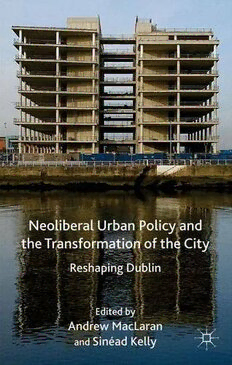
Neoliberal Urban Policy and the Transformation of the City: Reshaping Dublin PDF
Preview Neoliberal Urban Policy and the Transformation of the City: Reshaping Dublin
Neoliberal Urban Policy and the Transformation of the City This page intentionally left blank Neoliberal Urban Policy and the Transformation of the City Reshaping Dublin Editedby Andrew MacLaran AssociateProfessor,TrinityCollegeDublin,Ireland and Sinéad Kelly Lecturer,NationalUniversityofIrelandMaynooth Selectionandeditorialmatter©AndrewMacLaranandSinéadKelly2014 Individualchapters©Respectiveauthors2014 Allrightsreserved.Noreproduction,copyortransmissionofthis publicationmaybemadewithoutwrittenpermission. Noportionofthispublicationmaybereproduced,copiedortransmitted savewithwrittenpermissionorinaccordancewiththeprovisionsofthe Copyright,DesignsandPatentsAct1988,orunderthetermsofanylicence permittinglimitedcopyingissuedbytheCopyrightLicensingAgency, SaffronHouse,6–10KirbyStreet,LondonEC1N8TS. Anypersonwhodoesanyunauthorizedactinrelationtothispublication maybeliabletocriminalprosecutionandcivilclaimsfordamages. Theauthorshaveassertedtheirrightstobeidentifiedastheauthorsofthis workinaccordancewiththeCopyright,DesignsandPatentsAct1988. Firstpublished2014by PALGRAVEMACMILLAN PalgraveMacmillanintheUKisanimprintofMacmillanPublishersLimited, registeredinEngland,companynumber785998,ofHoundmills,Basingstoke, HampshireRG216XS. PalgraveMacmillanintheUSisadivisionofStMartin’sPressLLC, 175FifthAvenue,NewYork,NY10010. PalgraveMacmillanistheglobalacademicimprintoftheabovecompanies andhascompaniesandrepresentativesthroughouttheworld. Palgrave®andMacmillan®areregisteredtrademarksintheUnitedStates, theUnitedKingdom,Europeandothercountries. ISBN978–1–137–37704–3 Thisbookisprintedonpapersuitableforrecyclingandmadefromfully managedandsustainedforestsources.Logging,pulpingandmanufacturing processesareexpectedtoconformtotheenvironmentalregulationsofthe countryoforigin. AcataloguerecordforthisbookisavailablefromtheBritishLibrary. AcatalogrecordforthisbookisavailablefromtheLibraryofCongress. Contents ListofFiguresandTables vii Preface viii Acknowledgements ix ListofAbbreviationsandAcronyms x NotesonContributors xii Part I SettingtheContext 1 Neoliberalism:TheRiseofaBadIdea 3 AndrewMacLaranandSinéadKelly 2 IrishNeoliberalismandNeoliberalUrbanPolicy 20 AndrewMacLaranandSinéadKelly 3 Light-TouchRegulation:TheRiseandFalloftheIrish BankingSector 37 SinéadKelly 4 ThePoliticalEconomyofLegislativeChange:Neoliberalising PlanningLegislation 53 EndaMurphy,LindaFox-RogersandBernaGrist 5 TheChangingIdeologyandOperationofPlanning inDublin 66 AndrewMacLaranandNiallMcCrory Part II ThePropertyBoomandItsLegacy 6 ReadyMoney:Over-DevelopmentintheOfficesSector 93 AndrewMacLaran 7 ReadyMoney:ResidentialOver-Developmentand ItsConsequences 107 BrendanWilliamsandDeclanRedmond 8 TheFinancialisationofIrishHomeownershipandtheImpact oftheGlobalFinancialCrisis 120 DáithíD.Downey v vi Contents 9 BailingOuttheBanks:TheRoleoftheNationalAsset ManagementAgency 139 BrendanWilliams Part III ReshapingUrbanPolicyandReshapingtheCity 10 ActuallyExistingNeoliberalism:Public–PrivatePartnershipsin PublicServiceandInfrastructureProvisioninIreland 157 RoryHearne 11 TakingLiberties:GentrificationasNeoliberalUrbanPolicyin Dublin 174 SinéadKelly 12 NeoliberalisingtheCity‘Creative-Class’Style 189 PhilipLawton,EndaMurphyandDeclanRedmond 13 Neoliberal‘Regeneration’andtheMythofCommunity Participation 203 PaulaBrudellandKatiaAttuyer 14 TheCollapseofPPPs:ProspectsforSocialHousing RegenerationaftertheCrash 219 RoryHearneandDeclanRedmond 15 TheRoleofPrivateConsultanciesinNeoliberalUrban Regeneration 233 PaulaBrudell Part IV ConsiderationsandConclusions 16 ContestedUrbanEnvironments:CommunityEngagementand StruggleinCentralDublin 249 MichaelPunch 17 NeoliberalUrbanPolicyandChallengingtheIdeological Straightjacket 265 AndrewMacLaranandSinéadKelly Index 277 Figures and Tables Figures 5.1 Tax-incentiveareasininnerDublin 69 6.1 CompletionofofficespaceinDublin,1980–2011 94 6.2 Averagesizeofdevelopmentsreachingcompletion, 1995–2012 98 6.3 Dublindocklandsdevelopment,2013 101 6.4 Vacantnewlycompletedandoldermodernofficespace 103 6.5 City-widevacancyrates,1992–2010 104 8.1 Euro-areacreditgrowth,June1998–June2012((cid:2)M) 123 8.2 Ireland’shousingboom–bustcyclecomparedwithother advancedeconomies,2005–12 126 8.3 CapitalswitchingintoandoutofIrishhousing,1994–2008 130 11.1 LocationofIAPsandremitoftheDDDAmasterplan,1999 177 Tables 3.1 Assets,customerloansandprofitsgrowthofIrishbanksand buildingsocieties,2000and2007 47 7.1 Annualchangeinhousingsupply,GDPandGNP 108 7.2 Financeforpropertydevelopment 109 7.3 Mortgagelendingfornewandsecond-handdwellings 110 7.4 Mortgagelendingforresidentialpurposes 111 7.5 Averageannualhousepricechanges((cid:2)equivalent), 1996–2012 112 8.1 ThevolumeandvalueofIreland’smortgageequityrelease ‘top-up’loans 124 9.1 IncreasingrecapitalisationrequirementsforIrish banks,2009–11 146 11.1 Agestructureoftheinner40wards,1991,2002,2011 180 14.1 Selectedlocal-authorityestatesinDublin’sinnercity plannedforPPPregeneration 221 14.2 PlannedprivateandsocialunitsinselectedPPP projects,2008 221 14.3 OccupancyratesonPPPregenerationestatesinDublincity, 2008and2013 224 14.4 StatusofregenerationplansforselectedDublinPPPestates, September2013 225 vii Preface Neoliberalism, what it involves and how it has been implemented, varies considerably from place to place. In a context of high rates of unemploy- ment,sluggisheconomicdevelopmentandlarge-scaleemigration,theIrish stateenthusiasticallyespousedneoliberalism.Thisbookfocusesonthechar- acterandimpactsof‘actuallyexisting’neoliberalisminIreland,specifically in its capital city of Dublin. The city provides a particularly apposite loca- tion for an investigation into the urban impacts of neoliberal urban policy becauseDublin,withapopulationofoveramillionpeople,dominatesthe Irishurbanhierarchyandthenation’seconomyandhasbeenthefocusfor the‘newurbanpolicy’ofneoliberalthinkinginurbanrenewal. ThebookshowsthemannerinwhichneoliberalisminfusedIrishgovern- ment thinking at national and local levels. Thus, market-based approaches andfacilitatingprivate-sectoroperationsbecameincreasinglyingrainedinto the ideology of decision makers and established as an essential element of policy.Takingkeyinternationalthemesfromcontemporaryurbanresearch andfocusingonDublin,thebookdemonstratesthewayinwhichneoliberal urban policies brought about a reconfiguration of both social and spatial relationsinthecitythroughtheimplementationofnewapproachesinIrish urban planning, notably by facilitating the property-development sector and through urban-regeneration policies promoting ‘gentrification’. It also showshowitbecamepossibleforthemuch-lauded‘CelticTigereconomy’, heralded worldwide as an icon of what might be achieved under ‘light- touch’neoliberalfinancialregulation,withinafewyears,tobringaboutthe almosttotalcollapseofitsbankingsystem,the‘nationalisation’ofenormous private-sector debts, the rapid decline in the Irish economy, the imposi- tion of an austerity regime involving swingeing cuts to public services, the imposition of pay-cuts in the public sector, new and increasing taxes and charges and the effective bail-out of the Irish economy by the ‘troika’ of the European Union, the European Central Bank and the International MonetaryFund. Thebookcomprisesfourparts,settingthecontextualbackground,exam- iningtheproperty-developmentboomanditslegacy,reviewingtheimpacts ofneoliberalurbanpolicyinreshapingDublinand,finally,notingaspectsof public resistance to the operation of neoliberal urban policy. The conclud- ing section highlights some salient points which might be drawn from the continuing Irish experience of neoliberalism and policies of austerity and stressestheimperativeforstructuralanalysisofwhathappenedandwhy. viii
